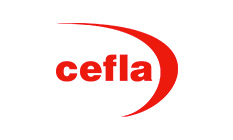Olivieri Carni
Energy
Background
Founded in 1975, Olivieri Carni – a long-standing Venetian firm specialising in the production, slaughter and distribution of veal and white meats – has an outstanding capacity for self-renewal. In 2006 the company implemented a far-reaching modernisation scheme. In 2013 came the restructuring of its slaughterhouse. Then, in 2016 the company completed the plant with a 3000 square metre extension designed to raise production area potential to the highest levels. Continuous investment in this specific area has always been pivotal to the success of Olivieri Carni, its goal being to maximise production while ensuring high quality and full compliance with certification standards to provide large-scale excellence. In 2017, the Veneto-based company contacted Cefla to achieve its next goal: to make production processes efficient from an energy standpoint too by minimising both consumption and CO2 emissions.
Power stems from control
Cefla understands that a tailor-made project capable of ensuring efficiency and value begins with proper feasibility analysis. Following an on-site inspection – performed together with a technical liaison officer assigned by Olivieri Carni – Cefla effected in-depth analysis of the customer’s production processes and energy profiles, dividing them into electricity, steam and hot water. After initial analysis, reassessment and further consideration, the proposed system sizing solutions focused on: electrical tracking, reduced steam use, use of refrigerating energy and the refrigeration circuit.
In addition to all this, the proposed Cefla solution had another key aim: to achieve more balanced, shrewder, higher-performing use of hot water. Cefla’s assessment of Olivieri Carni had, in fact, highlighted an issue is this regard: the production process featured a heat exchange control system used for washing, room heating and chilled water production (at -12 °C, for meat refrigeration purposes). The system’s design meant the plant made full use of hot water during the day but not at night, when it was used for interior heating only. This assessment proved to be vital, providing the foundation for a solution capable of generating significant energy savings.
TECHNICAL DATA
Electricity requirement: 5.800 MWhel
Heat requirement: 4.200 MWhth
Refrigerator requirement: 4.300 MWhfr
Electricity for Chillers: 1.500 MWhel
Hours of operation: 8.000 h/year
The project: strategy, efficiency and “green” savings
Cefla provided close customer support, ultimately offering a first-class “turnkey” solution with an excellent price-quality ratio. To ensure sustainability – both environmental and economic – Cefla presented an array of proposals with three different generator engine types and a distinct thermal solution, allowing identification, together with the customer, of the best solution from every possible viewpoint. The methane gas trigeneration system chosen for this project covers 79% of overall electricity demand, resulting in savings of around 50 euros/hour compared to the previous system. Furthermore, the system – customised with two 60 cubic metre tanks that store the heat energy produced at night and allow its reuse during peak daytime demand to achieve balanced hot water usage – optimises electricity consumption. It does so thanks also to the action of the new ammonia absorber (which replaces the old compressors) that produces refrigerating power via the energy produced by the superheated water. In addition to those energy savings, the entire operation has also had an outstanding “green” outcome as it cuts CO2 emissions by 870 tons a year, the annual equivalent of running 890 cars.
“Full service” customer experience
During the project, from initial customer contact to plant completion (which involved resolving certain roofing-related installation issues over an area of some 250 square metres) and during construction of the underground heat exchange recovery substations, Cefla always put the customer’s needs first. And it continues to do so by offering a full service maintenance plan for the cogeneration unit, all the connected end units and the ammonia absorption unit. Last but not least, Cefla also provided Olivieri Carni with close support in preparing all the documents for the compliance phase.










